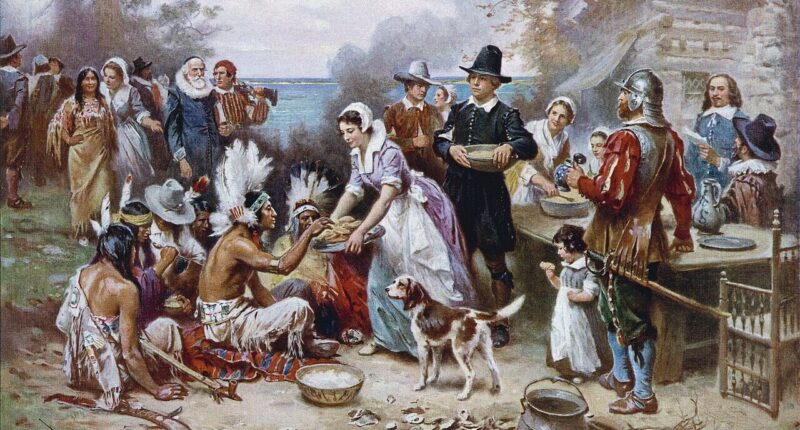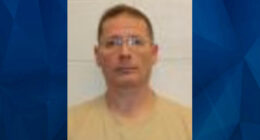As I sit here writing this piece, I’m keenly aware of my warm socks, my sweatshirt, and the heat humming quietly through my home. In the kitchen, I’ve already prepped pie crusts, peeled potatoes, and stacked ingredients that will all need tending on Thursday morning — Thanksgiving. And while I’ll be rushing around in a hurry Thursday morning, bemoaning the lack of space in my oven or too many people in the kitchen, it’s honestly pretty easy in comparison to what my ancestors were doing 404 years ago.
When the first Thanksgiving took place, my family didn’t have a heated home. They didn’t have refrigeration or the luxury of running to Shop Rite for last minute fixings. They were actually fighting not only for their lives, but for something much greater than themselves — and of course the left is trying to destroy that very thing.
Admittedly, I only recently discovered that my 11th-great grandfather, Thomas Rogers, came to America on the Mayflower. He signed the Mayflower Compact and endured the harsh conditions of the first winder but didn’t survive it. His son, Joseph, my many-times-over-great-uncle, survived the cold, the sickness, the uncertainty. And nearly a year alter, he was present at the first Thanksgiving (sorry to all the Virginia folk who stake a claim to another first Thanksgiving).
There are only two primary sources describing the first Thanksgiving. Edward Winslow’s account of the first Thanksgiving in “Mourt’s Relation,” describes how the Pilgrims, with their “fruits of our labors,” shared a three-day feast with “many of the Indians coming amongst us, and amongst the rest their greatest king Massasoit, with some ninety men, whom for three days we entertained and feasted, and they went out and killed five Deer, which they brought to the Plantation and bestowed on our Governor, and upon the Captain and others.”
The aid of the Wampanoag tribe was essential. They befriended the Pilgrims and taught them how to hunt, fish, and farm various crops that were new to the Englishmen.
“And although it be not always so plentiful, as it was at this time with us, yet by the goodness of God, we are so far from want, that we often wish you partakers of our plenty,” Winslow’s account continues.
[READ NEXT: Faith, Gratitude, And Perseverance: Americans Have Much To Learn From The Pilgrim Story]
William Bradford’s account, in “On Plimoth Plantation,” describes how the Pilgrims were fitting “up their houses and dwellings against winter, being all well recovered in health and strength and had all things in good plenty.”
And now, knowing my ancestor’s son was actually there, the scene feels less like a chapter in a history book and more like a living inheritance, something that is passed down and a reminder that the Pilgrims weren’t merely characters in a book, but real people whose courage and faith became part of the story my own family belongs to.
But it’s that sense of inheritance, of belonging to a shared American story — a shared nation– that the left wants to dismantle — and they do it through maligning Thanksgiving.
The Daily Orange’s Mateo Lopez-Castro suggested Americans should “recognize modern examples of genocide, colonialism this Thanksgiving.” According to Lopez-Castro, “Thanksgiving is, in essence, a celebration of genocide.” The ACLU of Wyoming suggested Americans should “start by acknowledging” that they’re on stolen land and “challenge the false and harmful Thanksgiving origin story.”
The Nation describes the classic Thanksgiving story as one “steeped in colonialism, violence, and misrepresentation.”
And part of why the Pilgrims’ story gets attacked is that it reminds people we do have a national inheritance — real roots and traditions and a shared beginning. In part, that’s what makes a nation. And it’s something that makes the left uncomfortable because a people who remember where they came from are harder to shame into believing that their country is irredeemably racist and must kowtow to the left’s radical nation-ending positions to atone. That’s why it’s no surprise then that the same writers who insist Thanksgiving is a celebration of “genocide” also push an immigration worldview that treats America as little more than a patch of dirt where anyone can arrive and instantly define the culture.
Lopez-Castro previously wrote a piece in which he makes clear his “heart stays with my Venezuelan compatriots, not just because I feel for them as a product of immigrants myself…” and that “the legitimate channels of American immigration have failed them because the system has been created to do exactly that” — as if America’s immigration system is flawed because it doesn’t prioritize foreigners over Americans. Lopez-Castro goes on to call America’s immigration policy as “fueled by white supremacy and platformed by institutionalized racism.”
The ACLU of Wyoming had an entire piece dedicated to shaming the immigration system since it apparently isn’t easy enough for foreigners.
The theme is the same: America is a racist place that owes the world entry to redeem itself and that the descendants of the people who settled this country — such as the Pilgrims — should feel guilty and ashamed.
But a people connected to their heritage cannot be convinced that they have no right to it, and a shared memory, like the Pilgrims’ first Thanksgiving, is something that unifies people. A unified country with a unified people are more difficult to crack. A country with no shared memory is easier to mold into something entirely new.
And once you understand that broader agenda, the rest of the narrative makes sense. And that’s why the attacks from the left fall apart the moment you begin to look at the real history.
Claims of genocide and brutality and shame ignore that the Wampanoag signed a peace treaty with the settlers that lasted for 50 years, but that, more importantly, the first Thanksgiving was not a celebration of conquest but rather one of acknowledged that the Pilgrims managed to survive a brutal first year and kept alive the experiment in self-government through faith.
What makes me especially proud of my ancestors and the first Pilgrims isn’t that they survived, or that they struck a peace treaty with the Wampanoag or that they learned to cultivate the land. It’s that they laid the foundations of something far bigger through the grace of God.
When the Pilgrims arrived at Plymouth, Thomas Rogers joined 41 others in signing the Mayflower Compact. It was barely 200 words, but it was one of the first attempts at self-government in the new world.
“IN THE NAME OF GOD, AMEN,” the compact begins, “Do by these Presents, solemnly and mutually, in the Presence of God and one another, covenant and combine ourselves together into a civil Body Politick, for our better Ordering and Preservation, and Furtherance of the Ends aforesaid: And by Virtue hereof do enact, constitute, and frame, such just and equal Laws, Ordinances, Acts, Constitutions, and Officers, from time to time, as shall be thought most meet and convenient for the general Good of the Colony; unto which we promise all due Submission and Obedience.”
The compact recognized that legitimate government derives from the people (and as the Pilgrims knew, ultimately from God), rather than a distant monarchy. It was the same type of foundational idea that our Founding Fathers later affirmed in the Declaration and Constitution.
John Quincy Adams later called it “perhaps the only instance, in human history, of that positive, original social compact, which speculative philosophers have imagined as the only legitimate source of government.”
And that is something to be immensely proud of. My ancestors lived in a difficult time and faced unimaginable hardship. But through their faith and courage, they built the foundation of a society based on the principles of self-government and faith.
Thanksgiving isn’t about guilt or shame or reducing our ancestors to symbols of sin. The Pilgrims trusted God the moment they stepped onto the Mayflower, and they trusted God through harsh winters and uncertainty. They gave thanks to survival, community, and the harvest. That same reliance on faith carried forward to the Founders, who built a nation on principles also seen in the Mayflower Compact.
So as I bake my pies, and mash my potatoes (and beg everyone to ‘Get out of my way’), I’ll also be mindful that all that I do on Thursday is a result of the sacrifices that generations made before me — and you better believe I’m proud of them.
Brianna Lyman is an elections correspondent at The Federalist. Brianna graduated from Fordham University with a degree in International Political Economy. Her work has been featured on Newsmax, Fox News, Fox Business and RealClearPolitics. Follow Brianna on X: @briannalyman2









